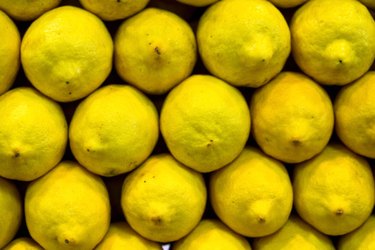
Home citrus growers often notice black spots developing on the surface of lemons, grapefruit, nectarines, limes, tangerines and oranges. While citrus fruit is susceptible many diseases, two common citrus fruit diseases, black spot and Alternaria fruit rot, cause black spots on fruit and affect the quality of the fruit.
Types
Video of the Day
Alternaria fruit rot primarily affects lemons and navel oranges, but it can occur in other citrus fruit. A fungus that only attacks citrus fruit causes this disease. Alternaria fruit rot often affects the inside of the fruit, making it inedible. Another disease known as black spot is a damaging citrus fruit disease. Black spot is a fungal disease identified in Africa, South America, Asia and Australia. Certain types of citrus fruits, such as limes, lemons, grapefruits, Valencias and mandarins, are especially susceptible to this disease.
Video of the Day
Effects
Alternaria fruit rot causes citrus fruit to turn light in color and drop from the tree prematurely. Some fruit may remain on the tree and black or dark brown spots develop on the blossom end of fruit. Black spots often extend inside the fruit into the center and large fruit may split. Citrus black spot causes fruit to develop black spots on the surface of the rind. When citrus fruit is infected with black spot, green circles often appear around the black spots. Black spots may be small and look similar to freckles or they may be larger lesions. High temperatures, sun exposure and stress all cause the symptoms of black spot to be more pronounced.
Cultural Control
Alternaria fruit rot is best controlled in citrus fruit by providing plenty of water through irrigation. Avoiding drought stress is key to preventing alternaria fruit rot. Another way to avoid alternaria fruit rot is by providing your citrus trees with proper amounts of fertilizer. Black spot is best prevented by keeping infected citrus out of black spot free areas. Keeping your grove or garden free from infected plant debris is essential in controlling fungal diseases.
Chemical Controls
Chemical control methods are not recommended for the treatment of Alternaria fruit rot. Black spot often requires the application of fungicides to keep it under control. Placing protective sprays using copper is often effective in preventing black spot on citrus fruit.